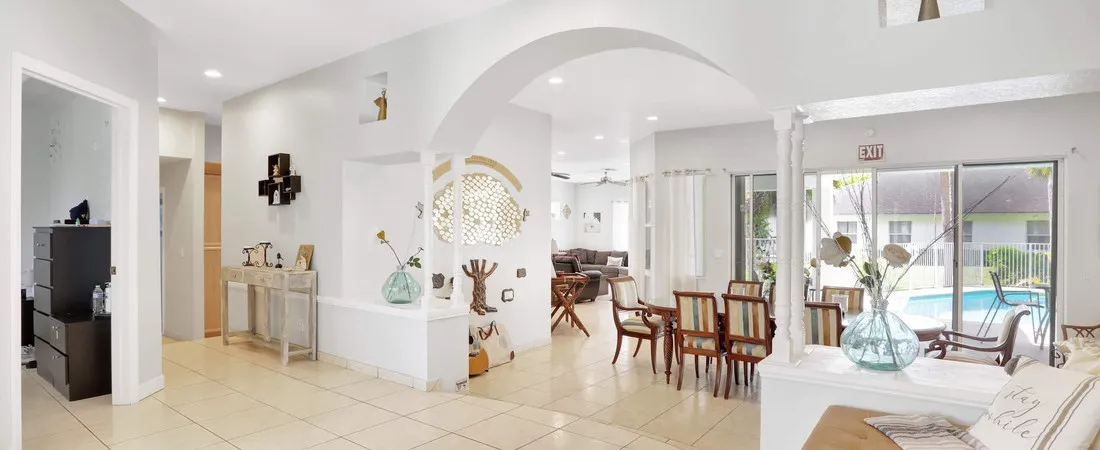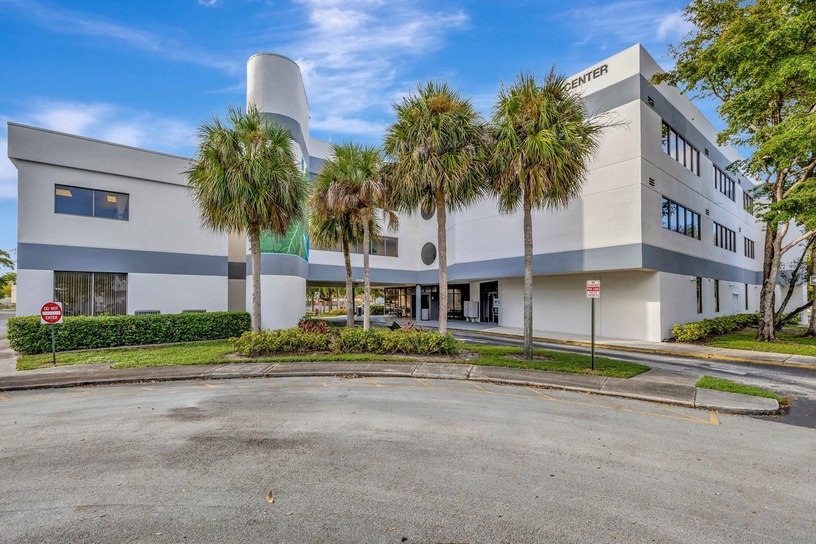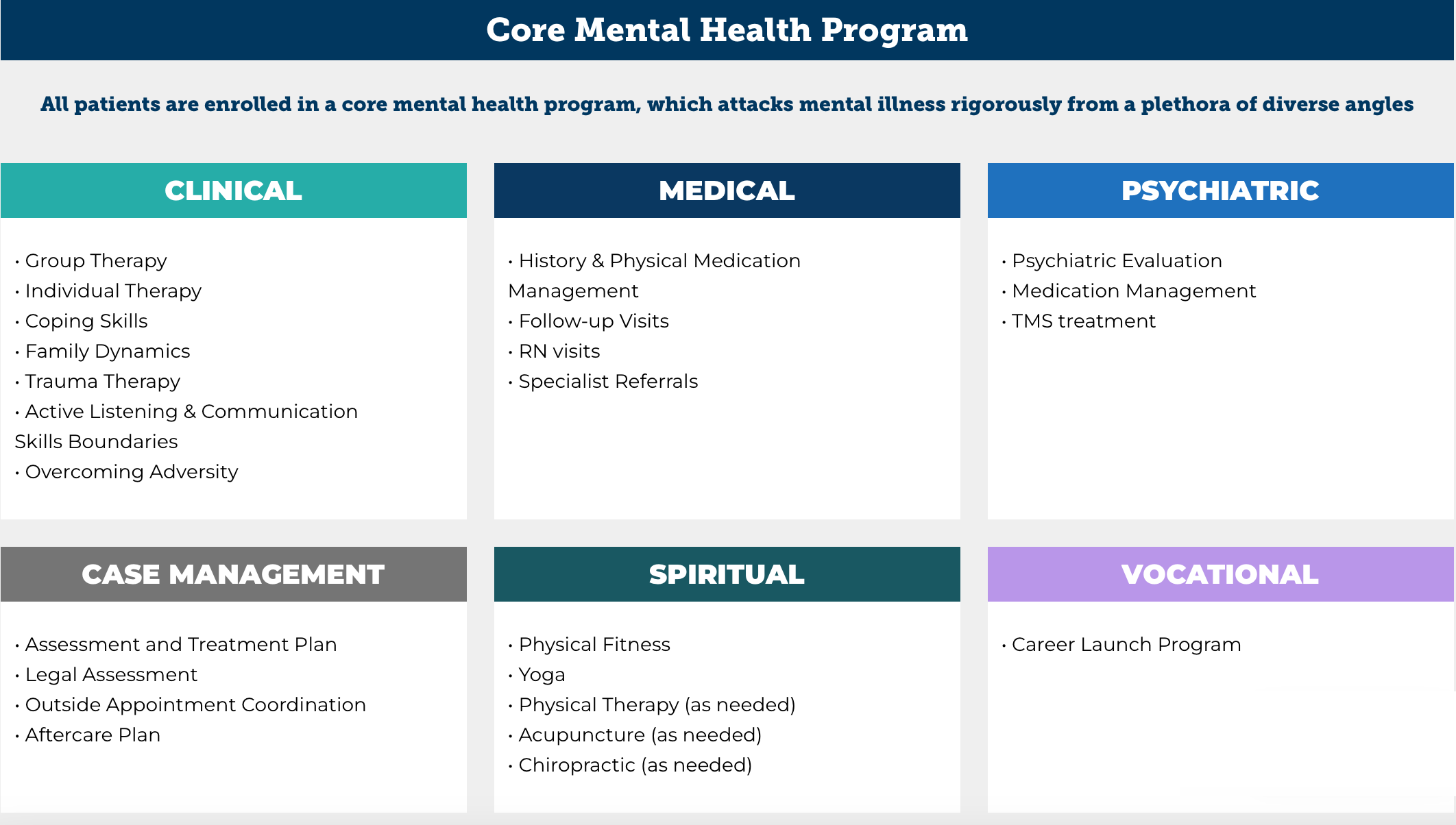Here, you’ll learn about inpatient mental health facilities in Florida and their specialized services. Find the vital information you need to make informed decisions for yourself or a loved one seeking inpatient psychiatric care for mental well-being support. Discover the compassionate care options available near you, ensuring a path toward healing and psychological wellness.

Inpatient Mental Health Facility in Fort Lauderdale, Florida
What Is an Inpatient Treatment Program?
An inpatient mental health treatment program is a structured, immersive option where individuals reside in a facility for a specified duration to receive intensive therapeutic, sometimes crisis interventions. These programs offer a supportive, controlled environment, ensuring 24-hour psychiatric care for substance use issues, mental health disorders, and dual diagnosis.
Patients benefit from a range of mental health services, including counseling, psychiatric medication management, and therapeutic activities, promoting a focused and holistic approach to mental health recovery. These intensive therapy programs assist in distancing individuals from daily stressors, enabling a more concentrated and productive healing journey.

Do Inpatient Mental Health Facilities Near Me Offer Mental Health Treatment?
Inpatient facilities are specifically designed to deliver extensive treatment, catering to individuals facing a spectrum of mental health and substance use conditions. These facilities provide a structured therapeutic environment, employing holistic mental health treatment that includes counseling, psychiatric care, and a diverse therapeutic milieu.
The overarching goal is to foster healing, stabilization, and sustainable recovery. With dedicated staff available round-the-clock, these facilities create a nurturing space, ensuring continuous support and a conducive atmosphere for effectively addressing and managing mental health concerns. Call 877-958-9212 to speak with a helpful patient advocate at The Sylvia Brafman Mental Health Center today and learn more about different mental health services.

What is Treated in Inpatient Mental Health Facilities?
Inpatient mental health facilities cater to various mental health disorders, offering intensive care and support. Though not exhaustive, the following examples highlight the diverse range of conditions addressed. From mood disorders and anxiety to severe psychiatric conditions, these facilities employ tailored treatment programs for comprehensive healing and recovery. Call 877-958-9212 to learn more about mental health treatment options in Florida.

Does Insurance Cover Mental Health Inpatient Treatment?
Yes, rehab insurance typically covers mental health inpatient treatment to varying extents, depending on the insurance plan and other factors. Most insurance plans include mental health services in their coverage, encompassing inpatient treatment for conditions that meet the criteria for medical necessity. Check your policy details, including copayments and deductibles, to understand the extent of support for inpatient care.
Mental health coverage under insurance plans has improved in recent years due to mental health parity laws mandating that insurance plans treat mental health and substance use disorder coverage on par with medical and surgical coverage. However, it’s crucial to verify the specifics of your plan, as coverage can vary. Call our team below as we can assist you or your loved one in navigating insurance matters and help you make informed decisions regarding mental health treatment.
Long-Term Inpatient Treatment Facility in Florida
Embarking on the journey of long-term inpatient treatment in Florida requires careful consideration and understanding of your options. While the following list provides examples, it is not complete. From serene retreats to specialized centers, these examples showcase the variety of long-term inpatient facilities available, each designed to address unique needs and support your path to sustained recovery.

Short-Term Inpatient Treatment Facility in Florida
Searching for short-term inpatient treatment facilities in Florida demands careful consideration. While the following list is not exhaustive, it offers a snapshot of diverse options for brief residential care in The Sunshine State. These examples provide insight into various short-term Florida inpatient mental health facilities available, each impactful and catering to specific needs.

At The Sylvia Brafman Mental Health Treatment Center, our committed team of experts is eager to assist you on your journey to well-being. Located in Fort Lauderdale, Florida, we provide an array of treatment programs, including Intensive Outpatient Programs (IOP) and Partial Hospitalization Programs (PHP), each meticulously crafted to suit your individual needs.
While we do not offer 24-hour inpatient care, we understand the importance of a supportive environment. That’s why we offer supportive lodging and can help you find comfortable accommodations in Florida, ensuring you have a nurturing place to stay during your treatment. This approach offers a flexible alternative to traditional inpatient care, making it a perfect fit for those interested in mental health therapy or even a wellness retreat experience in the picturesque setting of Florida.
Take the first step towards a healthier you by reaching out to us today. Whether it’s a phone call or filling out the form below for a callback, we’re here to support you every step of the way.
"*" indicates required fields

Do Inpatient Facilities Offer Dual Diagnosis Treatment?
Yes, inpatient facilities indeed offer dual diagnosis treatment, addressing co-occurring disorders where mental health and substance use challenges intersect. Recognizing the importance of integrated treatment, these programs provide specialized care for individuals with comorbid conditions, also known as concurrent disorders or psychiatric comorbidity.
Co-occurring disorders treatment in a psychiatric inpatient unit includes tailored interventions, such as therapy, medication management, and substance use counseling, aiming to address these coexisting conditions for a more holistic and effective opportunity for recovery. Contact us to learn more about our accredited dual diagnosis treatment programs in South Florida.
How to Find Inpatient Mental Health Facilities Near Me in Florida
The Sylvia Brafman Mental Health Center, accredited and situated in the scenic state of Florida, is celebrated for its commitment to evidence-based treatment programs. Distinguished as pioneers in mental health care, we emphasize unique and essential rehabilitation services that set us apart from traditional treatment centers. While we do not offer 24-hour inpatient care, our dedication extends to providing supportive lodging and assistance in locating comfortable accommodations for those participating in our Intensive Outpatient Programs (IOP) and Partial Hospitalization Programs (PHP).
This approach offers a flexible and effective alternative to conventional residential inpatient care, appealing to individuals seeking comprehensive mental health treatment or a wellness retreat in Florida’s serene environment. Our proactive, practical, and adaptable strategies underscore our commitment to enhancing mental health diagnoses and treatments, ensuring each individual receives the personalized care they deserve.
Additionally, we proudly accept insurance. For details and to schedule a free psychiatric assessment, call us below or feel free to visit our treatment center:
- The Sylvia Brafman Mental Health Center, 7710 NW 71ST CT, Tamarac, Florida, 33321

What is the Mental Health Inpatient Treatment Admissions Process?
Navigating the mental health inpatient treatment admissions process involves a personalized and comprehensive journey to ensure individuals with mental health or substance use concerns receive tailored care and support within the program. While the specific steps may differ across treatment centers, the following provides a general perspective on what to anticipate:
- Initial Connection: Embark on your journey by establishing the first connection. This phase involves an initial contact where you engage with the treatment center to express your concerns and initiate the admissions process. This crucial step sets the foundation for understanding your or your loved one’s unique needs and expectations.
- Exploration and Evaluation: Transition into a phase of exploration and evaluation. Here, the focus is on detailed psychiatric assessments to gain a profound understanding of your mental health or substance use concerns. This goes beyond conventional evaluations, ensuring a holistic perspective to tailor the upcoming treatment plan.
- Insurance Verification: Insurance verification helps navigate the complexities of insurance, ensuring clarity on coverage details and financial aspects. The goal is to streamline the process, allowing you to focus on your well-being without undue concerns about the finances.
- Crafting the Treatment Blueprint: Enter the phase of treatment planning. This step involves collaborative efforts to develop a personalized treatment plan. Instead of a one-size-fits-all approach, this blueprint is uniquely tailored to address your primary mental health diagnoses, emphasizing adaptability and effectiveness.
- Admissions: Experience the choreography of admissions coordination. This step is a dynamic orchestration of logistics to ensure a seamless transition into the inpatient program. From paperwork to facility logistics, the rehab admissions process provides a smooth entry, minimizing stress and enhancing comfort.
- Induction and Program Unveiling: This distinctive phase introduces you to the program’s environment, values, and methodologies. Orient yourself with the surroundings, fostering a sense of belonging and preparing you for active participation.
- Dynamic Engagement in Treatment: Engage in treatment. This phase emphasizes active participation, encouraging you to be an integral part of your healing journey. The program is designed to foster an immersive and collaborative experience, empowering you to take charge of your mental health.
- Ongoing Evolution and Adjustments: Embrace the ethos of consistent evolution and adjustments. Progress is continually monitored, and the treatment plan is adjusted as needed. This fluid approach ensures that your evolving needs are met, fostering a responsive, adaptable path to sustained well-being.
What Happens at an Inpatient Psychiatric Facility?
In an inpatient psychiatric facility, individuals undergo a transformative journey immersed in comprehensive mental health care. This environment offers a structured haven where daily activities span therapeutic engagements, such as individual and group therapy sessions, skill-building exercises, and medication management. The facility functions as a secure mental health unit, strategically distanced from external stressors, facilitating dedicated focus.
Moreover, the inpatient psychiatric facility operates as a collaborative hub, seamlessly integrating the expertise of mental health professionals, psychiatrists, and empathetic support staff. Together, this multidisciplinary team orchestrates a tailored approach, diligently addressing the distinctive needs of each individual under their care. The overarching mission is to stabilize individuals by mitigating acute symptoms and empowering them with mental health resources and solid coping strategies. This holistic endeavor aims for recovery, enduring mental well-being, and a path toward sustained, transformative growth.
How Much Do Inpatient Psychiatric Programs Near Me Cost?
The cost of inpatient psychiatric care in Florida hospitals varies and can range from $5,000 to $20,000 for a 30-day program. Factors such as the facility, duration of stay, level of care, and more influence these costs. It’s essential to check with individual facilities, assess insurance coverage, and inquire about financial assistance for accurate cost estimates.
Understanding the varying levels of care, duration impact, and insurance considerations is crucial when exploring the cost of inpatient psychiatric programs. Some facilities may offer financial assistance or sliding scale fees based on income, ensuring accessibility regardless of financial constraints. Discussing financial aspects and your specific needs with the chosen facility is recommended for informed decisions about inpatient psychiatric program costs in Florida. Contact us for an accurate assessment of your treatment costs.




